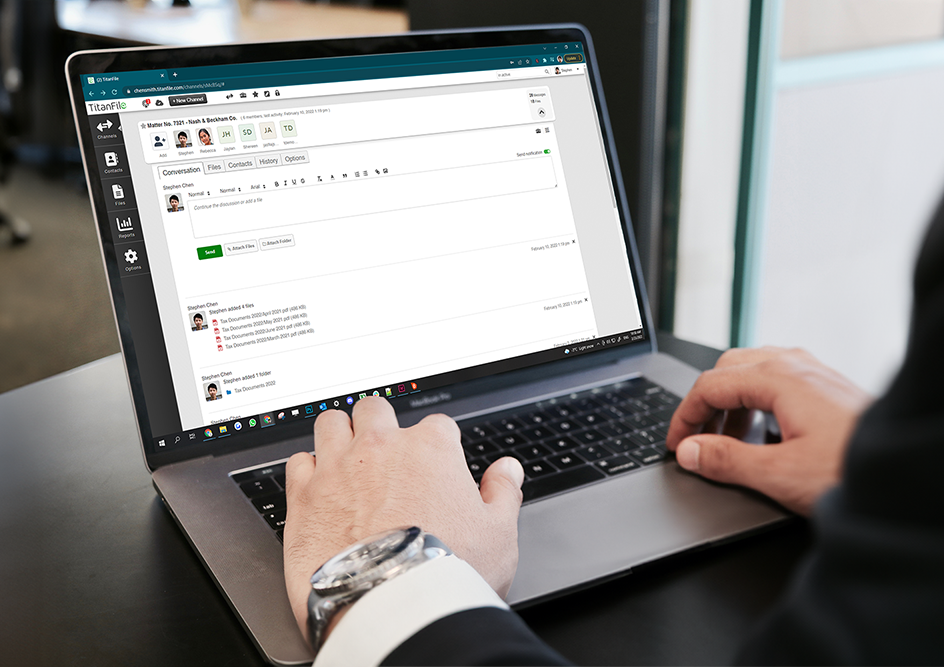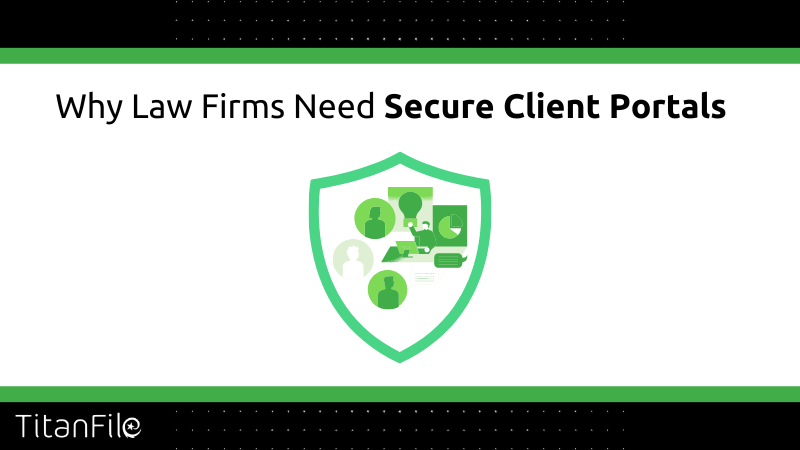We live in a time of rapid technological advancement, and every industry is striving to adopt the best tools to make work more streamlined and efficient. The legal industry is no exception. In today’s legal environment where client confidentiality is non-negotiable and regulators impose increasingly strict data-security requirements, traditional tools like email and courier no longer suffice.
A secure client portal not only enhances convenience but also provides a seamless communication platform for attorneys and their clients. It serves as a secure, authenticated workspace where attorneys and clients can exchange messages, request information, and share confidential documents without worrying about security. Unlike email, modern client portals include built-in encryption, access controls, and audit trails ensuring confidentiality while meeting compliance requirements and today’s stringent data-security expectations.
What is a Secure Client Portal? (Definition+How It Works)
A secure client portal for law firms centralizes attorney-client collaboration in a single digital workplace. Instead of juggling email inboxes, cloud storage links or USB drives, both attorneys and clients can –
- Send secure messages with end-to-end encryption
- Exchange confidential documents of any size or type in both directions
- Complete tasks and e-signature within the portal
- Receive notifications for new messages or uploads
- Set permissions to ensure the right people see the right information
- Detailed logs of document access
Unlike email, a secure client portal ensures every action is logged, audited and protected from interception. The American Bar Association (ABA) has emphasized that attorneys must take “reasonable efforts” to prevent unauthorized access to client communications; a standard that secure client portals fulfill far more effectively than traditional file-sharing methods.
Why Email Alone Isn’t Enough for Attorney-Client Communication
Emails have long been used in law firms due to their familiarity and ease of use. However, their vulnerabilities are well documented. Here are the risks associated with using email for client communication:
- Misdelivery risks – A single typo or auto-complete error can send sensitive files to the wrong recipient, exposing them to unauthorized parties
- Phishing & spoofing – Clients often struggle to distinguish between a legitimate attorney email and a fake one, making them vulnerable to handing over personal details that can be misused
- No end-to-end control – Once you hit ‘Send,’ and a document leaves your inbox, there’s no way to revoke access
- Lack of audit logs – Email provides no reliable way to confirm proof of delivery or track who opened or forwarded attachments
Given these risks, relying solely on email for client communication can expose firms to ethical violations and malpractice claims. To protect your law firm’s reputation, it’s wise to adopt secure client portals designed specifically for legal use. These platforms provide encryption, access revocation, verified audit trails, and alignment with both ABA confidentiality guidance and international data-protection standards.
Key Benefits of a Secure Client Portal for Law Firms
Implementing a secure client portal transforms attorney-client communication beyond simply replacing emails. The first and most critical advantage is protecting client confidentiality above everything else. With end-to-end encryption and granular access control, sensitive case files and communication remain safeguarded at every step. This level of security is not just to meet the compliance standard, but it’s also essential to build trust with clients who expect their information to be handled with utmost care and confidentiality.
This type of portal also centralizes communication into one secure, organized workplace. Instead of scrolling through endless email threads, attorneys and clients can view all case-related files, messages and updates in one location. This reduces friction, eliminates duplicate requests and ensures both parties always have access to the most recent version of a document.
Increased efficiency is another added benefit of using secure client portals. By cutting down on excessive email exchanges and eliminating the use of courier deliveries, secure client portals significantly improve work efficiency and turnaround times. Attorneys can request documents, and clients can upload them in real time without any delays. This practice streamlines workflows, making document collection faster and less prone to error.

The rise of remote and hybrid work has amplified the need for secure client portals in the legal industry. Whether lawyers are in the office, at home, or working remotely, they can securely log into the portal from anywhere. Clients also benefit from the flexibility to check updates, upload documents, and communicate with their legal team without the hassle of printing, scanning, or mailing the documents.
Every law firm strives for client satisfaction and trust. By using a secure client portal, you ensure that all communications with clients are secure, accessible, and efficient. This gives clients confidence in your representation and makes them feel better served. A smoother, more transparent process leads to stronger relationships and, ultimately, greater loyalty.
Consider the example of Dietrich Law, a Canadian personal injury firm. Before adopting a secure portal, the firm relied heavily on email and courier services, which slowed down case preparation and created unnecessary risks. After transitioning to a secure client portal, the firm reported dramatic improvements in efficiency and reliability. Clients quickly embraced the portal, resulting in 100% user adoption. The move not only boosted productivity but also reassured clients that their personal information was protected according to the highest standards of privacy and compliance
“ TitanFile is flexible, reliable, and has enabled us to send and receive confidential healthcare documents while meeting any concern for security. ”
– George Dietrich, Managing Lawyer at Dietrich Law
What Good Looks Like in Practice (Use Cases by Practice Area)
Litigation & eDiscovery
In litigation and eDiscovery, client portals allow firms to securely exchange large productions, expert reports, and court filings without the risk of email errors or courier delays. Attorneys gain the ability to manage high-volume exchanges while maintaining a complete audit trail, which is invaluable for both compliance and litigation readiness.
Corporate & Transactions
For corporate and transactional law, portals streamline the closing process by providing structured workspaces where parties can upload, review, and approve documents. Granular permissions ensure each counterparty only sees the information intended for them, reducing risk while keeping deals moving quickly.
Immigration, PI & Family Law
In areas like immigration, personal injury, and family law, portals simplify the client intake process. Clients can upload identification, medical records, or supporting documents directly from their phones, while attorneys can provide real-time updates. This accessibility not only improves efficiency but also strengthens the client relationship by offering a transparent, secure, and user-friendly experience.
How TitanFile Supports Secure Client Portals
TitanFile has become the trusted choice for top Am Law 200 firms because of its world-class security and ease of use. Attorneys and clients adopt it quickly because it is as easy to use as email while still providing the structure and protection of a modern law firm client portal. Within TitanFile. Law firms can create secure workspaces that centralize two-way collaboration, ensuring every message, file, and update is organized in one place. This not only improves the efficiency but also strengthens compliance by providing a clear, auditable record of attorney-client interactions.

The platform offers state-of-the-art security with end-to-end encryption, ensuring that your data is protected both in transit and at rest. With multi-factor authentication (MFA), single sign-on (SSO), granular access controls, and detailed audit logs, TitanFile gives users complete visibility and control over their data. TitanFile supports unlimited large file transfers at speeds up to 500 Mbps, making it ideal for litigation productions or corporate closings. The platform integrates directly with Outlook through its Secure Send feature, allowing staff to work within their familiar environment while enhancing security. With data residency options in the U.S., Canada, the EU, the Middle East, and Australia, and certifications including SOC 2 Type II, ISO 27001, HIPAA, GDPR, and PIPEDA, TitanFile gives law firms confidence that sensitive data is protected to the highest industry standards. In short, TitanFile delivers the ease, security, and compliance modern law firms need to run client portals successfully.
See how easy it is to send and receive files securely with TitanFile! Try it risk-free for 15 days – no credit card required. Want to explore your unique use case? Book a personalized walkthrough with one of our product experts.
Common Questions about Secure Client Portals for Law Firms
Is email secure enough for attorney-client communications?
No. Email lacks encryption, revocation, and audit trails. A law firm client portal vs email comparison clearly shows that portals provide the necessary confidentiality and compliance.
What features should a law firm client portal include?
Encryption, MFA, audit logs, granular permissions, and Outlook integration are essentials.
How is a portal better than secure email?
Secure email protects messages, but a portal adds organization, collaboration, and auditability across entire matters.
Will clients actually use a portal?
Yes. Firms like Marshall Dennehey and Crowe Soberman saw 90–100% adoption because portals were as simple as email but far more secure.



